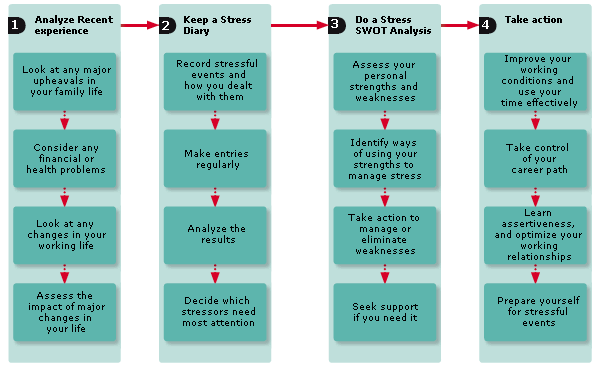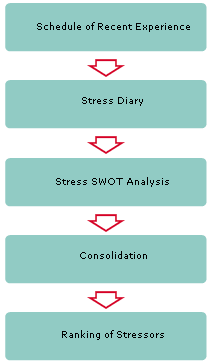Summary: Sources of Stress


In order to deal
effectively with the stress in your life, it is important to understand
precisely where the stress you experience comes from, to analyze your
reactions to it, and work to improve your responses. You can then
anticipate stressful situations, prepare for them, and learn to use the
most appropriate stress management techniques.
Target Your Stress Effectively
So far you have looked at what stress is, and at how
it affects your health and your performance. If you can work out how to
manage the stresses that your career brings, you will be able to rise
above them.
Prioritize Your Stresses
Once you have
identified the main sources of stress in your life, the next step is to
prioritize them so that you can separate the more important stressors
from the minor, infrequent irritations that do not deserve much
attention.
Work through your Schedule of Recent Experience sheet and list the events that still cause you stress now.
Look at the two lists you prepared during the analysis of your
stress diary. The first of these showed the most frequent things that
caused you stress, while the second list showed the most unpleasant
ones. Add these things to your list.
Run through the list of weaknesses and threats that you identified
in your Stress SWOT Analysis. If any of these cause some of the stress
that you are currently experiencing, make a note of them.
Consolidate any items that have the same underlying cause so that
each source of stress appears only once on the list. Strike out those
that you do not expect to happen again, or that are so minor that you
would not normally worry about them.
Rank the remaining items with the most important stressors at the
top of the list and the least important at the bottom. The items at the
top of the list are those that are most important for you to resolve.

Learn to Manage Stress
Once you have
identified the most important sources of stress in your life, the next
step is to identify stress management techniques that will help you to
deal with them. There are three major approaches to this:
Action-oriented approaches – These confront the problem causing
the stress, and change the environment or the situation. When you have
some power in a situation, action-oriented approaches are some of the
most satisfying and rewarding ways of managing stress.
Emotionally-oriented approaches – When you do not have the power
to change the situation, you can try to manage your stress by changing
your interpretation of the situation and the way you feel about it.
Acceptance-oriented approaches – When something has happened over
which you have no power and no emotional control (for example, when a
loved one dies), your focus is on surviving the stress. You need to
build buffers to help you to survive situations that you cannot change,
and learn to cope with the long-term stress that can lead to burnout.
Tip
Put together your list of stressors using a
spreadsheet on your computer – the list will then be much easier to sort
into the correct order.